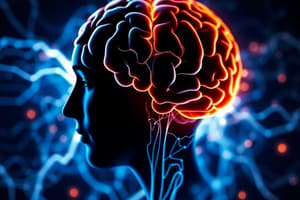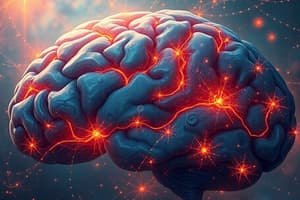Podcast
Questions and Answers
What is the primary function of sensory memory?
What is the primary function of sensory memory?
- To draw information from long-term memory
- To store information for an unlimited amount of time
- To organize information for transfer into working memory
- To retain sensory experience for a brief period (correct)
What can be said about the sensory memory capacity with age?
What can be said about the sensory memory capacity with age?
- It decreases significantly with age
- It remains relatively consistent with age (correct)
- It increases significantly with age
- It is only present in adults, not infants
What is the primary role of working memory in the information processing flow?
What is the primary role of working memory in the information processing flow?
- To organize information for transfer into long-term memory (correct)
- To retain sensory experience for a brief period
- To make decisions and execute problem-solving strategies
- To store information for an unlimited amount of time
What is the source of information that working memory combines to create a meaningful interpretation?
What is the source of information that working memory combines to create a meaningful interpretation?
What is the primary characteristic of long-term memory?
What is the primary characteristic of long-term memory?
What is an example of working memory in action according to the content?
What is an example of working memory in action according to the content?
What type of learning is referred to as implicit, where you remember something although you can't say why?
What type of learning is referred to as implicit, where you remember something although you can't say why?
What is the process of getting information out of storage so we can use it?
What is the process of getting information out of storage so we can use it?
What type of memory is involved when a sensory image elicits information stored in long-term memory?
What type of memory is involved when a sensory image elicits information stored in long-term memory?
At what age do children tend to have better recognition skills, especially for visual-spatial information?
At what age do children tend to have better recognition skills, especially for visual-spatial information?
What type of memory requires more effort, as the to-be-remembered information is not present?
What type of memory requires more effort, as the to-be-remembered information is not present?
What improves over the preschool years?
What improves over the preschool years?
What shows even longer-term developmental improvement?
What shows even longer-term developmental improvement?
What is an example of recall, as described in the content?
What is an example of recall, as described in the content?
What is a primary characteristic of working memory in relation to its capacity?
What is a primary characteristic of working memory in relation to its capacity?
Which statement accurately describes the role of attention in learning?
Which statement accurately describes the role of attention in learning?
How long can information typically remain in working memory without rehearsal?
How long can information typically remain in working memory without rehearsal?
Which best illustrates how working memory operates during a task?
Which best illustrates how working memory operates during a task?
What type of learning seems to bypass working memory?
What type of learning seems to bypass working memory?
What is necessary for the transfer of new information from working memory to long-term memory?
What is necessary for the transfer of new information from working memory to long-term memory?
What is a significant concern regarding young children's susceptibility to suggestion, as highlighted in the text?
What is a significant concern regarding young children's susceptibility to suggestion, as highlighted in the text?
What is a key characteristic of the study by Pettit, Fegan, and Howie (1990) that underscores the impact of suggestive questioning on young children?
What is a key characteristic of the study by Pettit, Fegan, and Howie (1990) that underscores the impact of suggestive questioning on young children?
Which of the following best explains the concept of "reality monitoring" as it pertains to young children?
Which of the following best explains the concept of "reality monitoring" as it pertains to young children?
Based on the text, what is a potential consequence of using guided imagery techniques with young children in memory recall?
Based on the text, what is a potential consequence of using guided imagery techniques with young children in memory recall?
What does the example of the imaginary friend illustrate regarding young children's cognitive development?
What does the example of the imaginary friend illustrate regarding young children's cognitive development?
What is the primary reason why young children are more susceptible to suggestion than adults?
What is the primary reason why young children are more susceptible to suggestion than adults?
What is the underlying implication of the text regarding the use of guided imagery techniques in memory recall with young children?
What is the underlying implication of the text regarding the use of guided imagery techniques in memory recall with young children?
What is the primary focus of the study by Pettit, Fegan, and Howie (1990) as described in the text?
What is the primary focus of the study by Pettit, Fegan, and Howie (1990) as described in the text?
Which of the following is NOT directly addressed in the text regarding young children's susceptibility to suggestion?
Which of the following is NOT directly addressed in the text regarding young children's susceptibility to suggestion?
What is the most likely implication of the text's statement that "young children's problems with reality monitoring can make him more susceptible to suggestion than older children or adults"?
What is the most likely implication of the text's statement that "young children's problems with reality monitoring can make him more susceptible to suggestion than older children or adults"?
Children diagnosed with ADHD have better attentional control than average children.
Children diagnosed with ADHD have better attentional control than average children.
Brain development in middle childhood is even and consistent across all children.
Brain development in middle childhood is even and consistent across all children.
Research suggests that ADHD is a distinct disorder with clear boundaries.
Research suggests that ADHD is a distinct disorder with clear boundaries.
Children who are more active and impulsive than average show rapid brain changes.
Children who are more active and impulsive than average show rapid brain changes.
Typically developing children do not show any neurological differences.
Typically developing children do not show any neurological differences.
Helpers should focus on the uniformity of brain development in middle childhood.
Helpers should focus on the uniformity of brain development in middle childhood.
Working memory is a part of the cognitive machinery that is crucial for maintaining attention, planning, problem-solving, and learning.
Working memory is a part of the cognitive machinery that is crucial for maintaining attention, planning, problem-solving, and learning.
Information processing always involves the conscious, deliberate use of working memory.
Information processing always involves the conscious, deliberate use of working memory.
Asian cultures, emphasizing conformity and collectivism, tend to promote earlier development of self-regulation skills in children.
Asian cultures, emphasizing conformity and collectivism, tend to promote earlier development of self-regulation skills in children.
Children from Western countries, like the United States and Great Britain, generally show slower development of executive functions compared to children from Asian countries like Japan and China, but adults from both regions ultimately achieve similar levels of performance on EF tasks.
Children from Western countries, like the United States and Great Britain, generally show slower development of executive functions compared to children from Asian countries like Japan and China, but adults from both regions ultimately achieve similar levels of performance on EF tasks.
Self-regulation is a cognitive process that is not influenced by socialization practices.
Self-regulation is a cognitive process that is not influenced by socialization practices.
The text highlights that information processing always involves conscious and deliberate effort, requiring the active use of working memory.
The text highlights that information processing always involves conscious and deliberate effort, requiring the active use of working memory.
Domain knowledge significantly enhances a child's logical thinking ability within a specific area.
Domain knowledge significantly enhances a child's logical thinking ability within a specific area.
Logical thinking is consistent across all content areas, regardless of the individual's knowledge in those areas.
Logical thinking is consistent across all content areas, regardless of the individual's knowledge in those areas.
Children who are passionate about music will reason about chemistry as effectively as those focused on chemistry.
Children who are passionate about music will reason about chemistry as effectively as those focused on chemistry.
Computers can be a significant part of a child's learning and socialization practices.
Computers can be a significant part of a child's learning and socialization practices.
The Piagetian perspective suggests that logical thinking is solely dependent on the child's developmental stage.
The Piagetian perspective suggests that logical thinking is solely dependent on the child's developmental stage.
Information processing approaches can reveal insights into children's cognitive abilities.
Information processing approaches can reveal insights into children's cognitive abilities.
Self-regulation in learning activities has minimal impact on children's academic performance.
Self-regulation in learning activities has minimal impact on children's academic performance.
Cross-cultural differences have no effect on the ways children engage with technology.
Cross-cultural differences have no effect on the ways children engage with technology.
Information processing always requires the conscious and deliberate use of working memory.
Information processing always requires the conscious and deliberate use of working memory.
Self-regulation skills are entirely innate and not influenced by socialization practices.
Self-regulation skills are entirely innate and not influenced by socialization practices.
Children from Asian countries like Japan and China consistently demonstrate faster development of executive functions compared to children from Western countries like the United States and Great Britain, even in adulthood.
Children from Asian countries like Japan and China consistently demonstrate faster development of executive functions compared to children from Western countries like the United States and Great Britain, even in adulthood.
Working memory, as a part of the cognitive machinery, solely focuses on holding information for a brief period without actively manipulating or processing it.
Working memory, as a part of the cognitive machinery, solely focuses on holding information for a brief period without actively manipulating or processing it.
Cross-cultural differences have a minimal impact on how children engage with technology.
Cross-cultural differences have a minimal impact on how children engage with technology.
Information processing theorists primarily focus on the role of working memory in cognitive development, neglecting other aspects of information processing like sensory memory and long-term memory.
Information processing theorists primarily focus on the role of working memory in cognitive development, neglecting other aspects of information processing like sensory memory and long-term memory.
Working memory is a part of the cognitive machinery that is only responsible for maintaining attention.
Working memory is a part of the cognitive machinery that is only responsible for maintaining attention.
Self-regulation is a cognitive process that is solely dependent on the child's developmental stage.
Self-regulation is a cognitive process that is solely dependent on the child's developmental stage.
Children from Western countries, like the United States and Great Britain, generally show faster development of executive functions compared to children from Asian countries like Japan and China.
Children from Western countries, like the United States and Great Britain, generally show faster development of executive functions compared to children from Asian countries like Japan and China.
Information processing always involves the conscious, deliberate use of working memory, and is never implicit.
Information processing always involves the conscious, deliberate use of working memory, and is never implicit.
Cross-cultural differences have a significant impact on the ways children engage with technology and develop self-regulation skills.
Cross-cultural differences have a significant impact on the ways children engage with technology and develop self-regulation skills.
Domain knowledge has no effect on a child's logical thinking ability within a specific area.
Domain knowledge has no effect on a child's logical thinking ability within a specific area.
A child's passion for music will significantly impact their ability to reason about chemistry, leading to similar proficiency as those with a passion for chemistry.
A child's passion for music will significantly impact their ability to reason about chemistry, leading to similar proficiency as those with a passion for chemistry.
Working memory operates solely through conscious and deliberate efforts, requiring the active use of working memory.
Working memory operates solely through conscious and deliberate efforts, requiring the active use of working memory.
Self-regulation in learning activities has minimal impact on children's academic performance.
Self-regulation in learning activities has minimal impact on children's academic performance.
Information processing always involves the conscious and deliberate use of working memory.
Information processing always involves the conscious and deliberate use of working memory.
Asian cultures, emphasizing conformity and collectivism, tend to promote earlier development of self-regulation skills in children.
Asian cultures, emphasizing conformity and collectivism, tend to promote earlier development of self-regulation skills in children.
Self-regulation is a cognitive process that is not influenced by socialization practices.
Self-regulation is a cognitive process that is not influenced by socialization practices.
Cross-cultural differences have no effect on the ways children engage with technology.
Cross-cultural differences have no effect on the ways children engage with technology.
Children from Western countries, like the United States and Great Britain, generally show slower development of executive functions compared to children from Asian countries like Japan and China, but adults from both regions ultimately achieve similar levels of performance on EF tasks.
Children from Western countries, like the United States and Great Britain, generally show slower development of executive functions compared to children from Asian countries like Japan and China, but adults from both regions ultimately achieve similar levels of performance on EF tasks.
Study Notes
Working Memory
- Working memory combines elements of supervisor's input with stored memories of prior interactions.
- It has a limited capacity, allowing us to think about a limited number of meaningful units of information at one time.
- Material is lost from working memory in 15 to 30 seconds unless we engage in rehearsal (e.g., repeating it to ourselves).
Attention and Learning
- Explicit learning requires working memory to recall information later.
- We must pay attention to and think about new information to get it into long-term memory.
- If we're not paying attention, we're unlikely to recall the information later.
Types of Memory
Sensory Memory
- Brief retention of sensory experience (about 1/3 of a second).
- Stores most of the sensory information that has come in, like a snapshot.
- Capacity does not seem to change much with age, even infants have similar sensory memory to adults.
Working Memory
- Partly a "short-term store".
- Allows us to focus attention, plan, execute problem-solving strategies, and make inferences.
- Organizes information for transfer into long-term memory.
- Information comes from immediate sensory experience and long-term memory.
Long-Term Memory
- Almost unlimited store of knowledge.
- Stores information from working memory.
Implicit Learning
- Learning that bypasses working memory.
- Involves lower-level, automatic processing.
- Enables storage of connections or associations between stimuli experienced together, even when not paying attention.
Retrieval
- Getting information out of storage so we can use it.
- Recognition: information is immediately available to our senses, and we realize it's familiar.
- Recall: to-be-remembered information is not present, and we must draw it out of long-term memory and re-present it to ourselves.
Teaching and Learning
- Teachers should be aware of how new information is assimilated and accommodated by students to promote effective learning.
- Asking probing questions can be helpful in promoting change in students' naive concepts.
- Knowing the structure of children's current conceptual ideas or "theories" can inform teaching and help modify pieces of the structure that support each other.
Children's Conceptual Understanding
- Children's models of a round Earth are often efforts to integrate the concept with their existing beliefs, such as the Earth being flat and gravity pulling things down.
- Children's understanding of gravity can make it difficult for them to comprehend why things wouldn't fall off the "bottom side" of a round Earth.
Educational Programming and School Readiness
- Experience with age-appropriate educational programming, such as Sesame Street and Dora the Explorer, is linked to improved school readiness, vocabulary growth, and better number skills by kindergarten.
- Quality educational programming for young children should feature child-directed speech, elicitation of responses, object labeling, and a coherent storybook-like framework.
Screen Time and Reading Skills
- Increased screen time can improve reading skills, but only if it doesn't displace reading books and other printed matter.
- Off-screen reading sources often provide more challenging content, which can improve reading skills.
- Electronic games can help develop skills, but excessive screen time can negatively impact school performance and emotional regulation.
Executive Functions and Self-Regulation
- Executive functions (EFs) improve during middle childhood, enabling children to consciously control their thinking, actions, and emotions.
- Self-regulation or inhibitory control is typically good by the end of middle childhood, but children may still struggle with tasks that require inhibition.
- Neural circuits that involve the prefrontal cortex mediate EFs, and their development depends on experience and practice.
Domain-Specific Knowledge and Learning
- The more you know about a particular subject, the more easily you can learn new information in that domain and the better you will remember it later.
- Age is not as important as knowledge in determining learning and retrieval abilities.
- Cross-cultural differences in executive functions highlight the role of experience in shaping cognitive development.
Children's Eyewitness Testimony
- Young children may have difficulty distinguishing between reality and fantasy, making them more susceptible to suggestion and false memories.
- Children's eyewitness testimony can be influenced by interviewers' suggestions, which can lead to false memories.
- Modern memory research has increased the acceptance of children's testimony in court, but it's essential to be aware of the potential pitfalls.
Executive Functions
- Children from Asian countries (e.g., Japan, China) develop executive functions more rapidly than children from Western countries (e.g., Great Britain, United States) during early childhood and adolescence.
- Culturally-based differences in socialization practices may contribute to this difference, with Asian parents emphasizing the inhibition of desires to conform to collectivist norms.
Working Memory
- Working memory is a key executive function that holds information we are actively thinking about.
- It enables us to maintain attention, plan, solve problems, and learn.
- Information processing occurs at two general levels: automatic/intuitive (bottom-up) and intentional (working memory).
- Working memory plays a central role in cognitive development.
Attention Deficit Hyperactivity Disorder (ADHD)
- ADHD may comprise more than one disorder, with different frontal brain areas affected in each type.
- ADHD is best considered dimensionally, lying at the extreme of a continuous distribution of symptoms and underlying cognitive impairments.
- Typically developing children who are more active and impulsive than average may also show slower brain changes.
Cognitive Development in Middle Childhood
- Brain development is uneven in middle childhood, both between and within children.
- Children may show lagging performance in some skills and rapid advances in others compared to their age mates.
- Logical thinking is domain-specific, meaning it is applicable to a particular area of knowledge.
- Domain knowledge influences logical thinking, with individuals better at identifying important features and relationships within their area of expertise.
Executive Functions
- Children from Asian countries (e.g., Japan, China) develop executive functions more rapidly than children from Western countries (e.g., Great Britain, United States) during early childhood and adolescence.
- Culturally-based differences in socialization practices may contribute to this difference, with Asian parents emphasizing the inhibition of desires to conform to collectivist norms.
Working Memory
- Working memory is a key executive function that holds information we are actively thinking about.
- It enables us to maintain attention, plan, solve problems, and learn.
- Information processing occurs at two general levels: automatic/intuitive (bottom-up) and intentional (working memory).
- Working memory plays a central role in cognitive development.
Attention Deficit Hyperactivity Disorder (ADHD)
- ADHD may comprise more than one disorder, with different frontal brain areas affected in each type.
- ADHD is best considered dimensionally, lying at the extreme of a continuous distribution of symptoms and underlying cognitive impairments.
- Typically developing children who are more active and impulsive than average may also show slower brain changes.
Cognitive Development in Middle Childhood
- Brain development is uneven in middle childhood, both between and within children.
- Children may show lagging performance in some skills and rapid advances in others compared to their age mates.
- Logical thinking is domain-specific, meaning it is applicable to a particular area of knowledge.
- Domain knowledge influences logical thinking, with individuals better at identifying important features and relationships within their area of expertise.
Studying That Suits You
Use AI to generate personalized quizzes and flashcards to suit your learning preferences.
Related Documents
Description
This quiz covers the concept of working memory, its limited capacity, and how it differs from long-term memory. Learn about the importance of rehearsal in retaining information in working memory.




